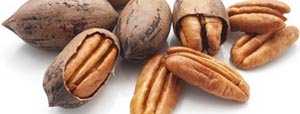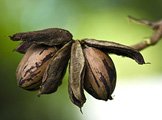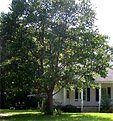Pecans Nutrition facts
Delicious, buttery-flavored pecans are one of the popular edible tree nuts known to American aborigines since antiquity. They are rich sources of many health-benefiting nutrients, minerals, and vitamins that are essential for optimum health.
Pecan is a large-sized deciduous tree belonging to the member of the hickory family, Juglandaceae. The tree is native to the central and southern parts of the United States of America. Today, however, it is being cultivated in many regions of the world as an important commercial tree-nuts crop.
Scientific name: Carya illinoinensis.
 |
| Pecans. Note oblong, gray-brown thin-shelled nuts and kernels inside. |
Several cultivars of pecans exist; some of the highly recommended species include Cape fear, Elliott, and Moreland.
During each spring season, pecan tree bears catkins, consisting of clusters of monoecious flowers arranged closely along a central stem that ultimately develops into fruits by autumn.

|

|
| Pecan nut enveloped by involucres. (Photo courtesy by cleopold). |
Pecan tree- Large sized deciduous tree, recognized as "Texas state tree." |
Pecan nuts, like other members of the hickory genus, are not really nuts but are considered botanically as fruits (drupe.)
Pecans are generally harvested from October through December. Raw nuts are then subjected to dehydration, a process which is essential to remove moisture and to improve their keeping quality.
Health Benefits of Pecans
Pecan nuts are a rich source of energy, carry 690 calories/100 g, and contain health-benefiting nutrients, minerals, antioxidants, and vitamins that are essential for wellness.
The nuts are rich in monounsaturated fatty acids like oleic acid and an excellent source of phenolic antioxidants. Regular addition of pecan nuts in the diet helps to decrease total as well as LDL or “bad cholesterol” and increases HDL or “good cholesterol” levels in the blood. Research studies suggest that the Mediterranean diet, which is rich in dietary fiber, mono-unsaturated fatty acids, and antioxidants would help to prevent coronary artery disease and strokes by favoring a healthy blood lipid profile.
Pecan nuts are a rich source of many phytochemical substances that may contribute to their overall antioxidant activity, including polyphenolic antioxidant ellagic acid, vitamin E, beta-carotene, lutein, and zeaxanthin. Research studies have been suggestive that these compounds help the body remove toxic oxygen-free radicals and thus, protect the body from diseases, cancers, as well as infections.
Anti-proliferative properties of ellagic acid are because of its ability to inhibit DNA binding of certain carcinogens such as nitrosamines and polycyclic hydrocarbons, thus, offering protection to the human body from cancers.
Pecans are an excellent source of vitamin-E, especially rich in gamma-tocopherol; provide about 25 g per 100 g. Vitamin E is a powerful lipid-soluble antioxidant, required for maintaining the integrity of cell membrane of mucus membranes and skin by protecting it from harmful oxygen-free radicals.
The nuts are very rich sources of several important B-complex groups of vitamins such as riboflavin, niacin, thiamin, pantothenic acid, vitamin B-6, and folates. Together, these vitamins work as co-factors for the enzyme metabolism inside the human body.
The nuts are also rich sources of minerals like manganese, potassium, calcium, iron, magnesium, zinc, and selenium.
Add a handful of pecan nuts to your diet to keep your diet meter complete with sufficient levels of minerals, vitamins, and protein.
| Principle | Nutrient Value | Percent of RDA |
|---|---|---|
| Energy | 691 Kcal | 34.5% |
| Carbohydrates | 13.86 g | 11% |
| Protein | 9.17 g | 17% |
| Total Fat | 71.9 g | 360% |
| Cholesterol | 0 mg | 0% |
| Dietary Fiber | 9.6 g | 25% |
| Vitamins | ||
| Folates | 22 µg | 5.5% |
| Niacin | 1.167 mg | 7% |
| Pantothenic acid | 0.863 mg | 17% |
| Pyridoxine | 0.210 mg | 16% |
| Riboflavin | 0.130 mg | 10% |
| Thiamin | 0.660 mg | 55% |
| Vitamin A | 56 IU | 2% |
| Vitamin C | 1.1 | 2% |
| Vitamin E | 24.44 mg | 163% |
| Electrolytes | ||
| Sodium | 0 mg | 0% |
| Potassium | 410 mg | 9% |
| Minerals | ||
| Calcium | 70 mg | 7% |
| Copper | 1.2 mg | 133% |
| Iron | 2.53 mg | 32% |
| Magnesium | 121 mg | 30% |
| Manganese | 4.5 mg | 196% |
| Phosphorus | 277 mg | 40% |
| Selenium | 3.8 µg | 7% |
| Zinc | 4.53 mg | 41% |
| Phyto-nutrients | ||
| Carotene-ß | 29 µg | -- |
| Crypto-xanthin-ß | 9 µg | -- |
| Lutein-zeaxanthin | 17 µg | -- |
Selection and storage
San Saba County in central Texas holds the reputation of "pecans capital of the world." Pecans can be available in the markets year-round. In the store, however, you might come across shelled, unshelled, salted, sweetened, etc. Try to buy whole “un-shelled” or “with shell” nuts instead of processed ones. They are generally available in airtight packs as well as in bulk bins.
Look for nuts that feature off-white color, healthy-looking, compact, uniform in size, and feel heavy in hand. They should be free from cracks (other than the natural split), molds, and spots and free from rancidity.

Raw whole pecan nuts are generally cut open at the processing units using larger sheller machines. Smaller nut-sheller machines or handheld pliers usually are being used for domestic purposes.
Unshelled pecans can be placed in a cool, dry place for many months, whereas shelled (without the shell) kernels (nuts) should be placed inside an airtight container and kept in the refrigerator to avoid them turning rancid.
Culinary use
Raw pecans, like in walnuts, can be eaten either alone, salted or sweetened.
Pecan nuts are buttery in consistency yet pleasantly sweet in taste. High-fat content in them makes them wonderful additions in the preparations of delicious recipes like pecan caramel puddles, pie, fudge, baklava, and muffins.
The kernels are often sprinkled over desserts, particularly sundaes, and bourbon ice creams.
They are widely employed in the confectionery, as an addition to biscuits, sweets, and cakes.
The nuts are also used to make pecan butter, which is popular spread over bread, toast, etc.
Safety profile
Pecans allergy is a type-1 (Ig-E mediated) hypersensitivity response in some people to food substances prepared with these nuts. In general, the allergic reaction may be more common in individuals with a history of prior exposure to the tree pollen and, thereby, developed antibodies. (Medical disclaimer).
≻≻-Back to Nuts and seeds from Pecans nutrition. Visit here for an impressive list of nuts and seeds with complete illustrations of their nutrition facts and health benefits.
≻≻-Back to Home page.
Further Reading:
USDA National Nutrient Database.(opens in new window)
Stanford School of Medicine Cancer information Page-Nutrition to Reduce Cancer Risk (Link opens in new window).